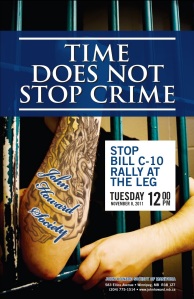The Canadian Centre for Policy Alternatives-MB invites you to join us for the release of the:
2011 State of the Inner City Report
Neo-Liberalism: What a Difference a Theory Makes
Wednesday, December 14th
Circle of Life Thunderbird House
715 Main Street
Lunch 11:30
Presentation 12 noon
RSVP By December 9:
ccpamb@policyalternatives.ca
phone 927-3200
by Christina Maes
After years of complaining that Canada is the only G-8 country without a National Housing Strategy, housing advocates are finally getting their way. The federal government is passing Bill C-10, the Omnibus Crime Bill, that will effectively house people, and especially people with a mental illness who engage in crimes of survival.
But on November 22, National Housing Day, housing advocates will still be complaining! They are holding a march, in connection with many more advocacy and front-line service agencies across Canada. These groups would have preferred Bill C-304, an Act to ensure secure, adequate, accessible and affordable housing for Canadians, but it died at the committee stage before the last election.
Bill C-10 will accomplish similar objectives as Bill C-304 would have, had it passed, albeit in very different ways. By creating mandatory minimum sentences and requiring longer sentences, Bill C-10 will house more people in jail for longer periods of time.
In a recent study of people experiencing homelessness in Winnipeg, it was shown that 24.4% of the people who were homeless had been in jail in the past year. Many people spoke about living a cycle caught between jail and street. People who were just released from jail ended up homeless because they could not find jobs, and lacked skills and resources to afford housing. Living in destitution with few options, some of these people were easily recruited by gangs to make a little money so they could afford food and shelter. Some people even said they engaged in petty crime just so they could have a warm, safe place to spend the night – a jail cell.
One man who was interviewed for the Winnipeg Street Health Report (released last June) had been kicked off welfare because he was getting his high school equivalency instead of working. He felt forced to deal drugs to make money and stayed at emergency shelters regularly. With this one ill planned and expensive government intervention, this young man will not have to worry about where his next meal will come from and where he will stay each night. Instead of a welfare rate of $555 per month to support the man in obtaining an education and becoming self-sufficient, the province can pay $4,854 per month, the cost of housing someone in provincial prison.
Housing in Canada has become a serious social, political and personal issue. About 3.3 million Canadians are living in substandard housing. It is estimated that at least 2,000 Winnipeggers are experiencing homelessness at any given time. In 2010, 510 children spent at least one night at Salvation Army’s family shelter or at Ndinawemaaganag Endaawaad Inc. youth safe house.
Emergency shelters and jails have very similar populations. Both have become homes for large numbers of people living in poverty. The authors of the Winnipeg Street Health Report found that about 45% of the people needing emergency shelters in Winnipeg were diagnosed with some form of mental illness. The population in correctional facilities in Canada have rates of mental illness three times higher than the general population. Providing overcrowded jail cells, rather than supportive housing, is not a good solution for people facing poverty and mental illness.
Housing is a basic human right. It is critical in determining how all aspects of our lives are fulfilled. The lack of affordable housing in Canada is costly for all Canadians – both socially and economically. When a society fails to meet the social needs of all of its citizens, there is more pressure put on our healthcare and criminal justice systems. It is simple math: provincial prison costs four times more than supportive housing. When people are denied access to decent jobs and incomes, they are excluded from the economic life of our community.
There was a time, not so long ago, that Canada was admired internationally for its strong affordable housing policies. We need to reclaim our status and create a National Housing Strategy that will begin the process of coordinating efforts, maintaining political will and building the national economy. There is so much that a housing strategy could do for Canadians, and all for a much smaller price tag than Bill C-10.
But until then, expect to hear more from housing advocates here in Winnipeg, and across Canada.
Christina Maes is a Policy Analyst for the Social Planning Council and a member of the Right to Housing Coalition.
For a PDF of this Fast Facts, click here.
For more information about the march on November 22, please visit the Right to Housing’s Facebook page.
The John Howard Society of Manitoba is organizing a rally to stop Bill C-10 (November 8, 12pm, at the Leg). For more information about this bill, see their fact sheet, below.
By the John Howard Society of Manitoba
Bill C-10, an omnibus bill, contains nine separate pieces of previously failed legislation. In addition to creating a number of new mandatory minimum sentences for a wide variety of offences, it increases the use of denunciation and longer sentences for young offenders, makes it easier for the Minister of Public Safety to deny Canadians incarcerated in other countries transfers back to Canada to complete their sentences here, and would delay or deny pardons outright for hundreds of thousands of Canadians with a criminal record.
As well, the Bill calls for a minimum sentence of nine months in jail for anyone found growing six or more pot plants, and would impose the same sentence for someone caught giving away as little as a single joint (which would count as trafficking, even if no money was involved).
The federal government and its supporters have not introduced any evidence to support its claims that Bill C-10 will reduce crime – and are simply ignoring 30 years of evidence from the United States showing that locking up more people, for longer, does not reduce crime.
Although it was introduced by the Federal Government, if passed, Bill C-10 would force the provincial governments to lock up more inmates, increasing overcrowding in provincial jails and further clogging up the courts. John Howard Society of Manitoba has calculated that three-fourths of the increased costs resulting from this Bill will have to be borne by the provinces, and only one-fourth by the federal government – and of course 100 percent of the cost will ultimately be borne by tax-payers.
The government has not released any credible figures in terms of the costs; however based on previous legislation, the John Howard Society of Manitoba calculates the costs to be about $2 billion a year in total (including both federal and provincial costs), or $1400 per tax-payer.
The Provinces of Newfoundland and Labrador, Quebec and Ontario have all spoken out against the Bill, as has the official opposition in British Columbia. Even New Brunswick, which supports the Bill, has said it can’t afford to pay the costs.
In brief, Bill C-10:
- Will not reduce crime, while diverting billions of dollars from healthcare, education, social services as well as strategies already proven to be effective at reducing crime.
- Will make it harder or even impossible for someone with a criminal record to get a pardon and move forward with their life in a positive, crime-free way.
- Will dramatically increase violence in prisons and jails, increasing risks for both inmates and staff. It will also make it harder, if not impossible, to offer programs in jails and prisons to help inmates rehabilitate themselves.
Other Voices
“I went from robbing 7-11 stores, robbing drug dealers, escaping from jail, to becoming a good father, a good member of society, a good taxpayer, a role model to other individuals that are facing the same challenge that I am,” said Chris Courchene, a 29-year-old Aboriginal man from Winnipeg, Canada’s violent crime capital according to Statistics Canada. “I feel that the proposed legislation paints everyone with the same brush. I think that the pardons should be for people who have clearly demonstrated without a doubt that they have reformed.” (At a press conference in Ottawa, ON October)
Wilma Derksen told the committee that finally hearing the truth about what happened to her daughter was a relief but the sentencing did not satisfy her need for justice. “The trial brought out the truth and it was the truth that healed us and set us free, not the sentencing. I still find no satisfaction in thinking that the man will be sitting in prison for the next 25 years. There is nothing life-giving about that. It’s just sad. And it’s going to cost us $2.5 million, probably.” (November 3, 2011, speaking to a House of Commons Standing Committee).
“If there is one common feature of these bills, it’s the ignoring, marginalizing and mischaracterizing of the evidence. The Government holds out the crime bill as a purported means of crime reduction, yet studies show that the resulting prison overcrowding and use of mandatory-minimum sentences will ultimately result in more crime.” (Irwin Cotler, Member of Parliament for Mount Royal and the Liberal critic for justice and human rights – Montreal Gazette, November 4, 2011)
About 13 per cent of the male inmate population is ‘double-bunked’ – housed in cells built for one person – and, under Bill C-10, that will increase to 30 per cent. “Prison overcrowding undermines nearly everything that can be positive or useful about a correctional environment,” Pierre Mallette, the head of the Union of Canadian Correctional Officers, said. “It is linked to increased levels of institutional violence, is a contributing factor to the spread of infectious disease and reduces already limited access to correctional programming and delays the safe and timely reintegration of offenders into the community.” (Montreal Gazette, November 4, 2011)
“If the prime minister’s tough-on-crime rules end up creating more ex-cons, and more hardened ex-cons, increasing the portion of our population with mental illnesses, poorer health, chronic unemployment, homelessness and family break ups, those are costs that are going to hit the provinces harder in their health care budgets and social support program budgets – and for years longer than the actual incarcerations.” (Kevin Libin, National Post, November 4, 2011)
Felix Collins, Newfoundland’s province’s justice minister, said he has never seen a study that favours more prison time as a way to cut rates of re-offence and improve public safety. “Incarcerating more people is not the answer,” Mr. Collins said (Globe and Mail, November 3, 2011).
The John Howard Society works with victims, offenders and communities to respond to the causes and consequences of crime.
Justice Murray Sinclair, the chair of the Truth and Reconciliation Commission, has graciously agreed to be a guest speaker at a CCPA-MB fundraising brunch in the Star Grill restaurant in the Assiniboine Park Conservatory. The theme of his presentation will be “Understanding the Legacy”. Seating is limited, so please order your tickets soon.
Sunday November 27, 2011, 10 a.m.
Star Grill Restaurant Assiniboine Park Conservatory
Tickets: $75.00 ($50.00 tax receipt)
To order tickets:
- PHONE the CCPA-MB office at 927-3200
- EMAIL sinclair-brunch@policyalternatives.ca
- Pop into the office (309 – 323 Portage Avenue) between 9 and 12, 1 to 4, Monday to Friday
You can pay by:
- Credit card (if you email please just ask for us to call you for the number)
- Cash
- Cheque made out to CCPA-MB
For more information on the Truth and Reconciliation Commission please visit: www.trc.ca







Follow us!